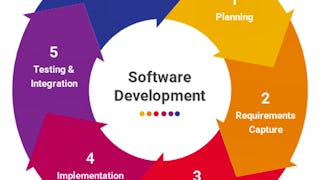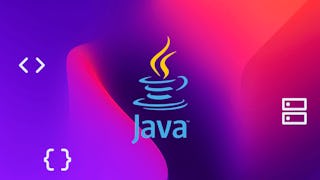- Browse
- Software Engineering
Software Engineering Courses
Software engineering courses can help you learn programming languages like Python and Java, software development methodologies, version control systems, and testing practices. You can build skills in code optimization, debugging, and collaborative project management. Many courses introduce tools such as Git for version control, Docker for containerization, and integrated development environments (IDEs) like Visual Studio Code, which enhance your ability to develop, test, and deploy software efficiently.
Popular Software Engineering Courses and Certifications
 Status: Free TrialFree Trial
Status: Free TrialFree TrialSkills you'll gain: Software Development Life Cycle, Software Architecture, Software Design, Software Development Methodologies, Software Design Patterns, Development Environment, Unified Modeling Language, Software Engineering, Web Applications, Software Development Tools, Software Development, Application Deployment, Programming Principles, Front-End Web Development, Back-End Web Development, Software Documentation, Computer Programming, Python Programming
4.7·Rating, 4.7 out of 5 stars4.5K reviewsBeginner · Course · 1 - 3 Months
 Status: Free TrialFree TrialStatus: AI skillsAI skills
Status: Free TrialFree TrialStatus: AI skillsAI skillsSkills you'll gain: User Story, Cloud Deployment, CI/CD, Software Development Life Cycle, Open Web Application Security Project (OWASP), Continuous Integration, Istio, Linux Commands, Software Architecture, Cloud Computing Architecture, Application Deployment, Test Driven Development (TDD), Kubernetes, Restful API, Git (Version Control System), DevOps, Grafana, Software Engineering, Data Import/Export, Application Development
Build toward a degree
4.6·Rating, 4.6 out of 5 stars64K reviewsBeginner · Professional Certificate · 3 - 6 Months
 Status: NewNewStatus: Free TrialFree Trial
Status: NewNewStatus: Free TrialFree TrialSkills you'll gain: Test Driven Development (TDD), Unit Testing, Test Planning, Debugging, Browser Compatibility, Performance Testing, Security Testing, Software Testing, System Testing, Test Script Development, Behavior-Driven Development, API Testing, Code Coverage, Integration Testing, Test Case, Test Automation, Test Tools, Issue Tracking, Code Review, Continuous Delivery
Intermediate · Specialization · 1 - 3 Months
 Status: Free TrialFree TrialT
Status: Free TrialFree TrialTThe Hong Kong University of Science and Technology
Skills you'll gain: Software Design Patterns, Requirements Analysis, White-Box Testing, Software Architecture, Acceptance Testing, Software Development Methodologies, Unified Modeling Language, Software Development Life Cycle, Configuration Management, Debugging, Software Design, Process Driven Development, Software Engineering, Software Testing, Object Oriented Design, Functional Requirement, Data Modeling, Systems Design, Project Management, Project Planning
4.6·Rating, 4.6 out of 5 stars609 reviewsIntermediate · Specialization · 3 - 6 Months
 Status: Free TrialFree Trial
Status: Free TrialFree TrialSkills you'll gain: Prompt Engineering, Prompt Patterns, ChatGPT, Generative AI, AI Workflows, Context Management, Decision Making
4.8·Rating, 4.8 out of 5 stars7.7K reviewsBeginner · Course · 1 - 4 Weeks
 Status: Free TrialFree TrialD
Status: Free TrialFree TrialDDuke University
Skills you'll gain: File I/O, Java Programming, Software Design, Debugging, Software Engineering, Javascript, Computer Programming, Event-Driven Programming, Encryption, Algorithms, Image Analysis, AI Personalization, Program Development, Data Processing, Statistical Analysis, Data Import/Export, Predictive Modeling, Integrated Development Environments, Data Analysis, Cascading Style Sheets (CSS)
4.6·Rating, 4.6 out of 5 stars22K reviewsBeginner · Specialization · 3 - 6 Months
What brings you to Coursera today?
 Status: NewNewStatus: Free TrialFree Trial
Status: NewNewStatus: Free TrialFree TrialSkills you'll gain: Test Planning, Software Testing, Debugging, Test Case, Issue Tracking, Functional Testing, Unit Testing, Software Quality Assurance, System Testing, Test Tools, Acceptance Testing, Integration Testing, Test Driven Development (TDD), Test Automation, Regression Testing, Quality Assurance, Waterfall Methodology, Agile Methodology, Python Programming
Beginner · Course · 1 - 4 Weeks
 Status: Free TrialFree TrialStatus: AI skillsAI skills
Status: Free TrialFree TrialStatus: AI skillsAI skillsSkills you'll gain: Prompt Engineering, Large Language Modeling, Cloud Deployment, Software Development Life Cycle, Cloud-Native Computing, Istio, Software Architecture, Kubernetes, Node.JS, React Redux, Cloud Computing Architecture, Restful API, Responsive Web Design, Django (Web Framework), Git (Version Control System), HTML and CSS, Server Side, Cloud Computing, Data Import/Export, Engineering Software
Build toward a degree
4.6·Rating, 4.6 out of 5 stars60K reviewsBeginner · Professional Certificate · 3 - 6 Months
 Status: Free TrialFree Trial
Status: Free TrialFree TrialSkills you'll gain: Software Development Life Cycle, Linux Commands, Software Architecture, Bash (Scripting Language), Restful API, Shell Script, Git (Version Control System), GitHub, Software Design, Flask (Web Framework), Version Control, File Management, Linux, Software Development Methodologies, Software Design Patterns, Application Deployment, Data Import/Export, Programming Principles, Web Scraping, Python Programming
4.6·Rating, 4.6 out of 5 stars51K reviewsBeginner · Specialization · 3 - 6 Months
 Status: Free TrialFree TrialStatus: AI skillsAI skills
Status: Free TrialFree TrialStatus: AI skillsAI skillsSkills you'll gain: File I/O, Git (Version Control System), Software Development Methodologies, JUnit, Requirements Analysis, Version Control, Application Development, Software Development Life Cycle, SQL, Full-Stack Web Development, Test Driven Development (TDD), Systems Development, Software Development, Functional Requirement, Restful API, Object Oriented Programming (OOP), Database Management, Digital Transformation, Java Programming, Generative AI
4.4·Rating, 4.4 out of 5 stars526 reviewsBeginner · Professional Certificate · 3 - 6 Months
 Status: Free TrialFree TrialU
Status: Free TrialFree TrialUUniversity of Alberta
Skills you'll gain: Software Architecture, Model View Controller, Unified Modeling Language, Object Oriented Design, Service Oriented Architecture, API Design, Web Services, Software Design Patterns, Software Design, Simple Object Access Protocol (SOAP), Microservices, Restful API, Code Review, Product Family Engineering, Software Systems, Object Oriented Programming (OOP), Software Development, Java, Software Documentation, Maintainability
4.6·Rating, 4.6 out of 5 stars4K reviewsBeginner · Specialization · 3 - 6 Months
 Status: Free TrialFree TrialM
Status: Free TrialFree TrialMMicrosoft
Skills you'll gain: CI/CD, Cascading Style Sheets (CSS), GitHub, C# (Programming Language), HTML and CSS, Azure DevOps, Load Balancing, Continuous Integration, Git (Version Control System), Role-Based Access Control (RBAC), Scalability, Object Oriented Programming (OOP), Authentications, ASP.NET, Full-Stack Web Development, Web Development, SQL, Microsoft Copilot, .NET Framework, Graph Theory
4.6·Rating, 4.6 out of 5 stars367 reviewsBeginner · Professional Certificate · 3 - 6 Months
Searches related to software engineering
In summary, here are 10 of our most popular software engineering courses
- Introduction to Software Engineering: IBM
- IBM DevOps and Software Engineering: IBM
- Software Testing and Quality Engineering: Edureka
- Software Engineering: The Hong Kong University of Science and Technology
- Generative AI: Prompt Engineering Basics: IBM
- Java Programming and Software Engineering Fundamentals: Duke University
- Software Testing Life Cycle (STLC) Fundamentals: Edureka
- IBM Full Stack Software Developer: IBM
- Applied Software Engineering Fundamentals: IBM
- Amazon Junior Software Developer: Amazon
Frequently Asked Questions about Software Engineering
Software engineering is the systematic application of engineering approaches to software development. It encompasses the processes, methods, and tools used to design, develop, test, and maintain software systems. This discipline is crucial because it ensures that software is reliable, efficient, and meets user needs. As technology continues to evolve, the demand for skilled software engineers grows, making this field essential for innovation and progress across various industries.
A career in software engineering can lead to various roles, including software developer, systems architect, quality assurance engineer, and project manager. Additionally, specialized positions such as DevOps engineer, data engineer, and software security analyst are increasingly in demand. Each of these roles plays a vital part in the software development lifecycle, contributing to the creation of robust and user-friendly applications.
To succeed in software engineering, you need a blend of technical and soft skills. Key technical skills include programming languages (like Java, Python, or C++), understanding algorithms and data structures, and familiarity with software development methodologies such as Agile and DevOps. Soft skills like problem-solving, teamwork, and effective communication are equally important, as they enable collaboration within diverse teams and help in addressing user needs.
There are numerous online courses available for those interested in software engineering. Some highly regarded options include the Software Engineering Specialization and the IBM DevOps and Software Engineering Professional Certificate. These programs cover essential concepts and practical skills, providing a solid foundation for aspiring software engineers.
es. You can start learning software engineering on Coursera for free in two ways:
- Preview the first module of many software engineering courses at no cost. This includes video lessons, readings, graded assignments, and Coursera Coach (where available).
- Start a 7-day free trial for Specializations or Coursera Plus. This gives you full access to all course content across eligible programs within the timeframe of your trial.
If you want to keep learning, earn a certificate in software engineering, or unlock full course access after the preview or trial, you can upgrade or apply for financial aid.
Learning software engineering involves a combination of theoretical knowledge and practical experience. Start by selecting foundational courses that cover programming basics and software development principles. Engage in hands-on projects to apply what you've learned. Additionally, participating in coding challenges and contributing to open-source projects can further enhance your skills and confidence.
Software engineering courses typically cover a range of topics, including programming languages, software development methodologies, algorithms, data structures, software testing, and project management. Advanced courses may also explore specialized areas such as software architecture, security, and emerging technologies like artificial intelligence and machine learning.
For training and upskilling employees in software engineering, programs like the Applied Software Engineering Fundamentals Specialization and the Generative AI in Software Engineering Certification Specialization are excellent choices. These courses provide practical skills and knowledge that can be directly applied in the workplace, helping teams stay competitive in a rapidly changing tech landscape.










